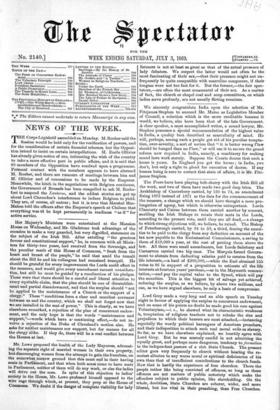Her Majesty's Ministers were entertained at the Mansion House on
Wednesday, and Mr. Gladstone took advantage of the occasion to make a very guarded, but very dignified, statement on the subject of the Irish Bill. After extolling "the gracious favour and constitutional support," he, in common with all Minis- ters for thirty-two years, had received from the Sovereign, and the peculiar merit of this House of Commons, "fresh from the heart and breast of the people," he said that amid the tumult about the Bill he and his colleagues had remained tranquil. He should be grateful for every improvement the Lords could effect in the measure, and would give every amendment earnest considera- tion, but still he must be guided by a recollection of his pledges. These were that there should be a careful and liberal attention to every equitable claim, that the plan should be one of disestablish- ment and partial disendowment, and that the surplus should "not be applied to the maintenance of a Church or the support of a clergy." These "conditions form a clear and manifest covenant between us and the country, which we shall not forget now that we are installed in the seat of power." This is clearly, as we have elsewhere remarked, a rejection of the plan of concurrent endow- ment, and the only hope is that the words "maintenance and support,"—words which have a. continuing effect,—do not in- volve a rejection of the Duke of Cleveland's motion also. He asks for neither maintenance nor support, but for manses for all the clergy alike. If they do, there will be a real conflict between the Houses at last.






























